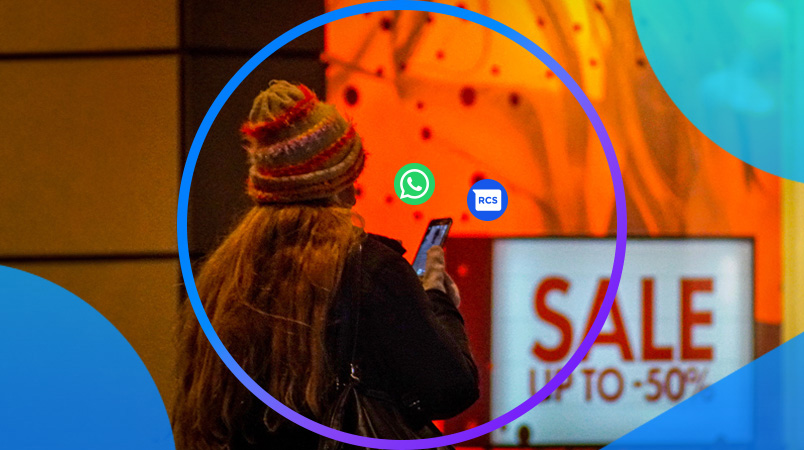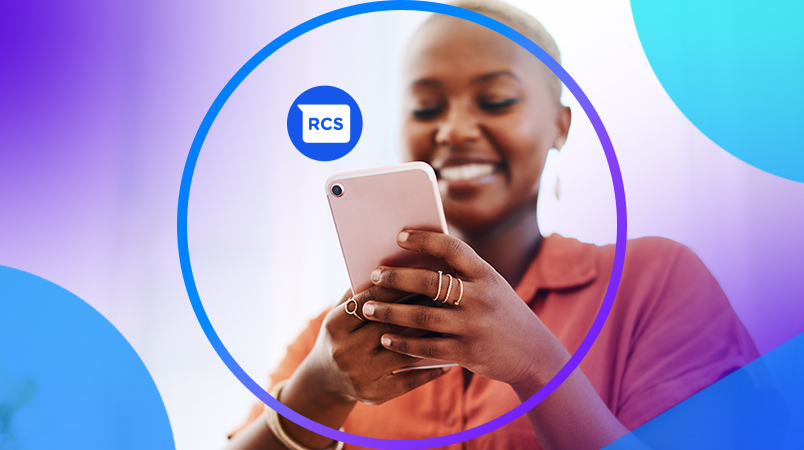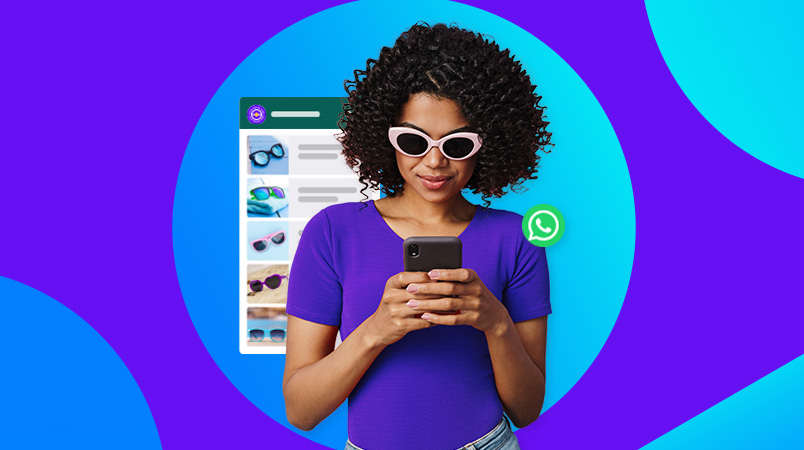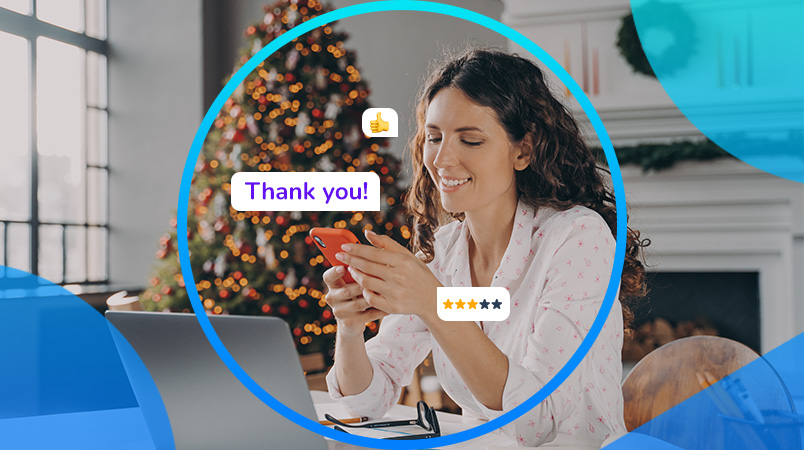Driven jointly by global carriers and Google, RCS for Business can be seen as an upgraded SMS service. But RCS offers a much richer experience, with app-like media and interactive features. You can send images, video, cards, add buttons, send verification codes, facilitate payments, and much more. And that's not all!
The advantage of RCS for Business is not just limited to its enhanced visual appeal. It offers these rich experiences in the native SMS inbox of mobile devices without requiring app downloads or adding contacts. This makes it a great tool for business communication use cases. But before we dive into the most common use cases, let's discuss the different types RCS messages there are.
RCS for Business Grows With Your Brand
There are three message types in RCS for Business: Basic, Single, and Conversation, and you can choose one of them, or scale up as you go, depending on your current business needs.
1. Basic: Upgraded “SMS” With a Verified Sender Profile
Basic is the entry-level form of RCS for Business. Like SMS, it supports up to 160 characters, cannot send images, but can include a URL.
The key distinction compared to ordinary SMS is Sender ID verification: after verification, the business name, logo, official phone, and verification badge appear at the top of the message. This makes the sender easily recognizable to the user.
Basic RCS messaging is suitable for use cases like sending one-time verification codes, policy updates, account changes, brief order or logistics notifications. The verified Sender ID helps improve user trust.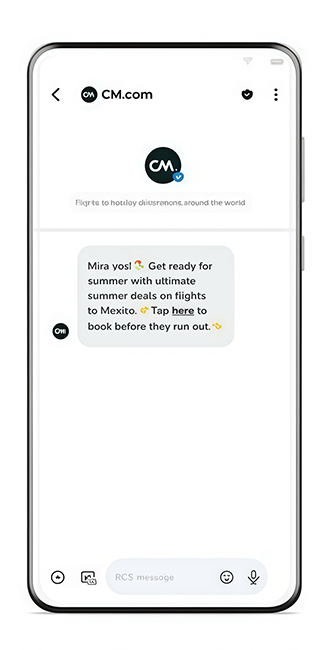
2. Single: See → Click → Convert in One Card
Building upon Basic, Single adds rich media and interactive buttons, turning the message from purely “read-only” to actionable.
Enterprises can upload images, videos, or GIFs within the message. Below, buttons can be set for actions such as opening a webpage, launching an app, making a call, opening a map, adding to calendar, etc. Users can complete tasks such as tracking logistics, changing address, booking a test drive, redeeming coupons, etc., without leaving the messaging interface.
For businesses in logistics, airlines, e-commerce, ticketing, or industries needing instant feedback, Single RCS Messaging is a core tool for enhancing experience and conversion.
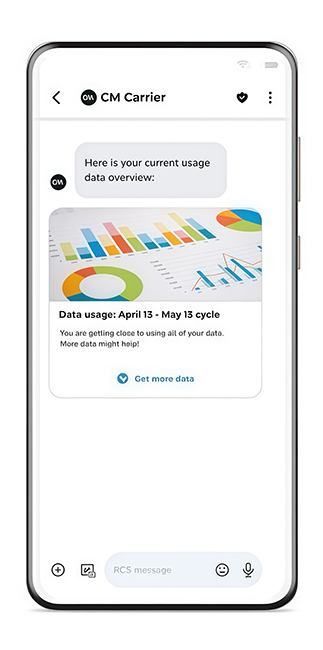
3. Conversation: The Entire Customer Journey In One Conversation
Conversation mode supports sending rich media (images, video, audio, PDF, etc.), multiple images in a carousel, etc. Once the user replies to the business message, the Conversation is activated, and the enterprise can respond to the user’s messages, providing whatever assistance is needed.
From marketing, ordering, to after-sales support, the full customer journey can be embedded in the message thread. Want to engage deeply with your customers and boost your sales? This is the message type for you!
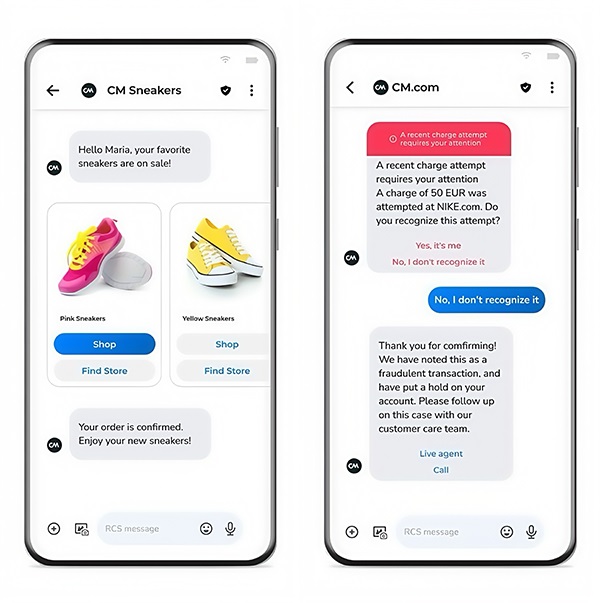
In terms of billing: Basic and Single are charged based on message deliveries. Conversation mode depends on whether the user replies. If there's no reply, it’s charged per delivery; if the user replies, it's billed per conversation.
Three RCS for Business Use Cases
RCS is not just more visually pleasing than SMS, but it is also a powerful asset for many business use cases worldwide.
1. Secure Verification, Enhanced Trust
With cybercrime on the rise, verification codes or One Time Passwords (OTPs) are becoming an essential part of registrations, logins, or payments. Traditional SMS codes are widely used to send OTPs, but because they lack visual verification and security cues, they leave the user vulnerable to phishing.
Advantages of RCS OTPs:
Sender ID verification: all RCS for Business sender profiles are verified. This also means that your brand can display a business logo, name, and the verification badge to help prevent phishing.
High deliverability: RCS for Business supports fallback to SMS if a user’s device doesn’t support RCS, ensuring the message reaches the user.
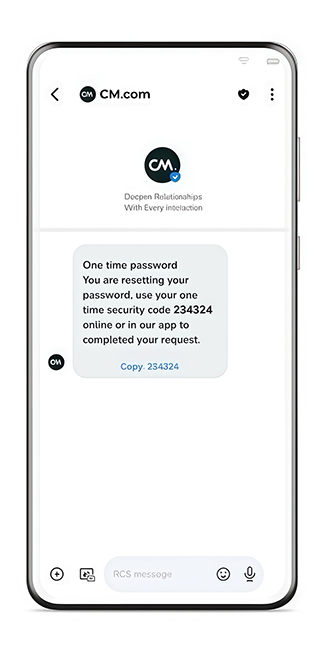
2. Information as a Service with Rich Notifications
In sectors like logistics, aviation, healthcare, education, notification messages are key to maintaining customer relationships. Traditional SMS can only deliver text, it cannot meet modern users’ demand for “visual and actionable” content.
Advantages of RCS notifications:
Visual display: flight updates, delivery status, appointment reminders, track&trace maps, etc. can be shown clearly in rich media cards.
One-click actions: users can click “track delivery,” “reschedule flight,” “confirm appointment,” etc., right in the message - no need to jump to an app or website.
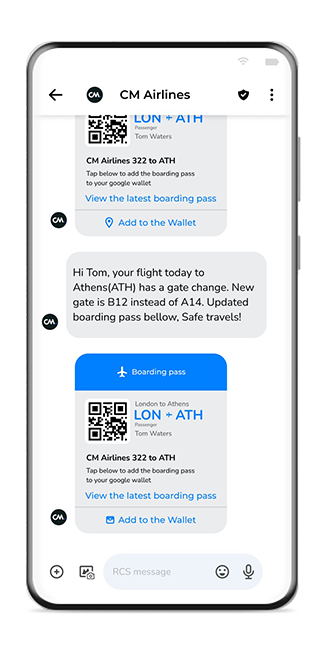 3. From Spam to Engaging Marketing Messages
3. From Spam to Engaging Marketing Messages
Traditional marketing messages can often be seen as “spam”, especially via SMS or email. RCS marketing messages, on the other hand, redefine “message marketing” with their visual appeal, interactive convenience, and brand credibility.
Advantages of RCS Marketing Messages:
Rich content display: Supports carousels, videos, coupons, QR codes, and more to enhance user engagement.
High-conversion journey: Users can complete the full “browse–select–click–purchase” process directly within the message.
Brand credibility: Verified sender IDs increase user trust and interaction, reducing concerns about SMS fraud.
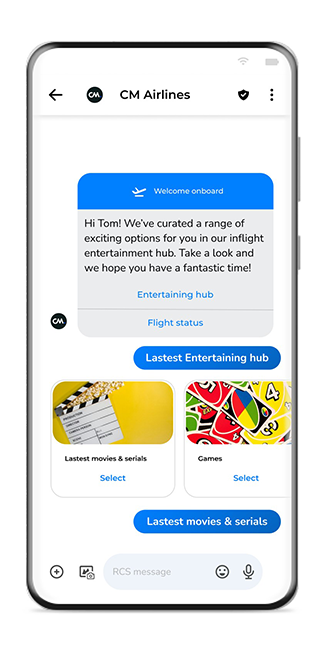 Now Is the Perfect Time to Deploy RCS
Now Is the Perfect Time to Deploy RCS
In an era where the customer experience reigns supreme, RCS Business Messaging offers you a more efficient, secure, and brand-centric communication solution. Combining the broad reach of SMS with the interactive experience of modern apps, it serves as the “next-generation text messaging” to connect with users, boost conversions, and strengthen brand trust.
RCS Business Messages transforms every message into a brand experience users are eager to open, engage with, and convert.

